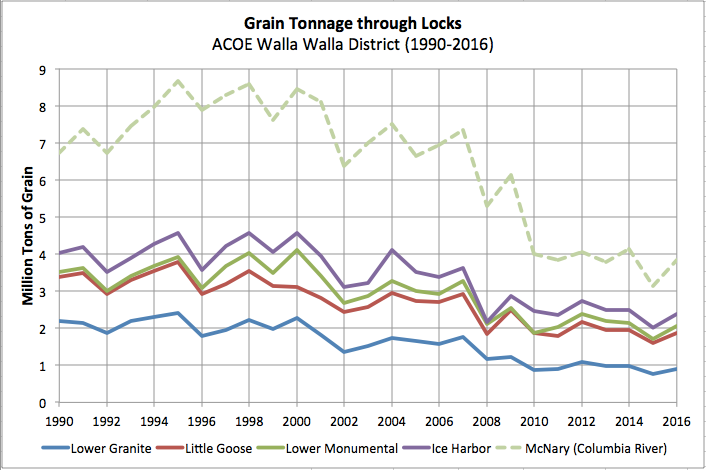forum
library
tutorial
contact

Seattle Study Favors Breaching Dams.
'Slap in the Face,' says Tri-Cities Congressman
by Annette Cary
Tri-City Herald, July 29, 2019
|
the film forum library tutorial contact |

|
Seattle Study Favors Breaching Dams.
by Annette Cary
|
"But the farmers, barge captains and crews, elevator company workers, port employees, community businesses, recreational companies,
staff that work at the four dams -- they are not made up, They are real people, with real families and real jobs contributing to our economy."
 Congressional representatives for the Mid-Columbia blasted a new study on Monday that concluded that the benefits of removing the four lower Snake River dams exceed the costs.
Congressional representatives for the Mid-Columbia blasted a new study on Monday that concluded that the benefits of removing the four lower Snake River dams exceed the costs.
The study was done in Seattle by ECONorthwest for another Seattle-based company, Vulcan Inc., which oversees the business and philanthropic interests of the late Microsoft co-founder Paul Allen.
The study said that there would be costs due to lost barge transportation and lost hydropower generation of electricity, but that the public benefits still justify removing the four dams from Ice Harbor upriver to Lower Granite.
"This privately funded study is a slap in the face of our state's agricultural economy," said Reps. Dan Newhouse and Cathy McMorris Rodgers, both R-Wash., in a joint statement.
"It is another example of Seattle-based interests failing to understand our way of life in Central and Eastern Washington," they said.
The analysis said that the public highly values protection of salmon and steelhead and are willing to pay to protect ecosystems, habitats and resources.
Removing the dams could have the potential to reduce the extinction risk for threatened and endangered fish stocks, the study said.
However, it acknowledges there is much scientific debate about the level of benefit, given the many factors that have led to fish population declines.
STUDY: NONECONOMIC BENEFITS ARE KEY
The study found that households were willing to pay about $40 more a year for electricity to help protect wild salmon, although the study said that much extra money would not be needed.
It put the potential "non-use," or noneconomic value to the public of removing the dams at $10.97 billion.
That would be $8.65 billion after figuring in the estimates for actual economic factors such as the $1.1 billion cost of removing the dams and the higher costs of electricity without the hydropower.
"Increases in carbon emissions, higher electricity bills and billions of dollars in infrastructure improvements that would be needed for irrigation and transportation hardly come across as ‘public benefit'," Newhouse and McMorris Rodgers said.
Tri-City economic development and electric utility officials have said that the Tri-Cities has the most to lose if dams are removed.
The study said that the dams provide only 2 percent of the region's energy needs during the winter and summer.
But local officials said that on the hottest days of the year, Ice Harbor Dam is positioned to supply as much as 30 percent of the electricity used in Pasco and Richland.
The study said changes to the electrical distribution grid could be made.
It also said that a free-flowing river would increase its recreation value, bringing in tourism dollars, particularly in Clarkston, Wash., and Lewiston, Idaho.
REAL JOBS FOR REAL PEOPLE
Pacific Northwest Waterways Association -- a coalition of Northwest wheat farmers, towboat companies and others -- also rejected the report.
It said the report suggests that farmers and other economic "losers" from dam removal could simply get new jobs as dam-busters, dismantling the infrastructure that currently supports their families and their communities.
"Non-use, which guesstimates the public's willingness to pay, is a pie-in-the sky, made-up number economists use when all else fails," said Jeff Shawver, president of the Washington Association of Wheat Growers.
"But the farmers, barge captains and crews, elevator company workers, port employees, community businesses, recreational companies, staff that work at the four dams -- they are not made up," he said. "They are real people, with real families and real jobs contributing to our economy."
An environmental study mandated by the federal court is now being done to look at removing or breaching the four lower Snake River Dams.
It is being done by federal scientists and experts who "should be able to do their jobs without groups from downtown Seattle dictating a cursory conclusion," Newhouse and McMorris Rodgers said.
learn more on topics covered in the film
see the video
read the script
learn the songs
discussion forum
